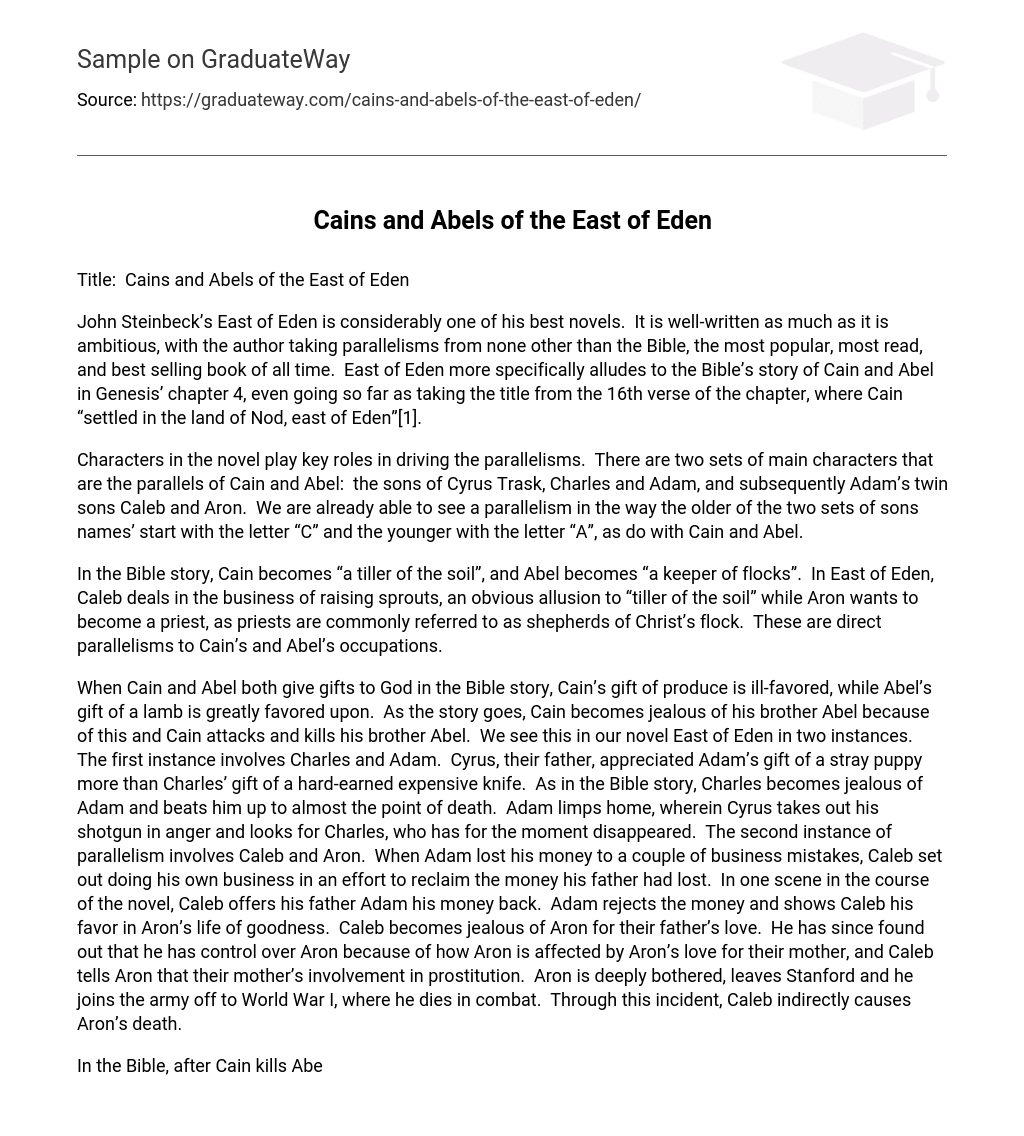Title: Cain and Abel of East of Eden
John Steinbeck’s East of Eden is considered one of his best novels. It is well-written and ambitious, with the author drawing parallels from none other than the Bible – the most popular, most read, and best-selling book of all time. East of Eden specifically alludes to the Bible’s story of Cain and Abel in Genesis chapter 4. The title itself comes from verse 16, where Cain settled in the land of Nod, east of Eden”.[1]
Characters in the novel play key roles in driving the parallelisms. There are two sets of main characters that parallel Cain and Abel: the sons of Cyrus Trask, Charles and Adam, and subsequently Adam’s twin sons, Caleb and Aron. A parallelism is already evident in the way the older set of sons’ names start with C” while the younger set starts with “A,” just like Cain and Abel.
In the Bible story, Cain became a tiller of the soil,” and Abel became “a keeper of flocks.” In East of Eden, Caleb deals in the business of raising sprouts, which is an obvious allusion to “tiller of the soil,” while Aron wants to become a priest. Priests are commonly referred to as shepherds of Christ’s flock. These are direct parallelisms to Cain’s and Abel’s occupations.
According to the Bible story, when Cain and Abel both gave gifts to God, Cain’s gift of produce was ill-favored while Abel’s gift of a lamb was greatly favored. As a result, Cain became jealous of his brother and attacked and killed him. This theme is present in our novel East of Eden in two instances.
The first instance involves Charles and Adam. Their father Cyrus appreciated Adam’s gift of a stray puppy more than Charles’ expensive knife that he had worked hard for. Similar to the Bible story, Charles becomes jealous of Adam and beats him up almost to the point of death. After returning home injured, Cyrus takes out his shotgun in anger but cannot find Charles who has disappeared momentarily.
The second instance involves Caleb and Aron. When Adam lost his money due to business mistakes, Caleb sets out on his own business venture with hopes of reclaiming what his father had lost. In one scene during the novel, Caleb offers his father money back but is rejected as Adam shows favor towards Aron’s life filled with goodness instead. This causes Caleb to become jealous towards Aron for their father’s love.
Caleb finds out that he has control over Aron because Aron is affected by their mother’s involvement in prostitution which he tells him about causing deep disturbance within him leading him to leave Stanford and join World War I where he dies in combat indirectly caused by Caleb.
In the Bible, after Cain kills Abel, God leaves a mark on Cain. In the novel, this parallelism is shown twice. The first instance involves Charles, who is scarred while attempting to move a large rock from his fields. The second instance involves Caleb when Adam instills a mark in him by saying “timshel,” which means “thou mayest” in Hebrew. It is interesting to note that this mark on Caleb leads him to overcome his evil nature, in deep contrast to the Bible story where the mark only serves as protection for Cain outside of the Garden of Eden.
Another parallelism can be found in the continuation of Caleb and Aron’s bloodline. In the Bible, Abel dies, and Cain is the only one who has children. Similarly, in the novel, only Caleb survives and is capable of having children. However, Aron dies during the war, making it impossible for him to have any offspring.
In Chapter 51 of the story, Steinbeck portrays Caleb as playing the Cain role most strikingly. When Adam inquires about Aron’s whereabouts, Caleb responds with Am I supposed to look after him?” This is a direct parallel to Cain’s response of “Am I my brother’s keeper?” when God asked him where Abel was after he had killed him.
References:
The United States Conference of Catholic Bishops published an article on Genesis Chapter 4 on December 9, 2002. The article can be retrieved from the New American Bible website and was accessed on September 4, 2007. The link to the website is http://www.nccbuscc.org/nab/bible/genesis/genesis4.htm.
Steinbeck, J. (1952). East of Eden. New York: The Viking Press.
Refer to the New American Bible web page (2002) by the USCCB for Genesis chapter 4. The link is http://www.nccbuscc.org/nab/bible/genesis/genesis4.htm and was accessed on September 24, 2007.





